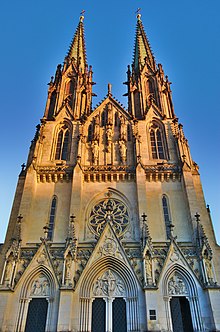
Back الدين في التشيك Arabic Náboženství v Česku Czech Religión en República Checa Spanish Uskonto Tšekissä Finnish Religion en Tchéquie French Religija u Češkoj Croatian Religioni nella Repubblica Ceca Italian チェコの宗教 Japanese Religia w Czechach Polish Religião na Chéquia Portuguese
Religion in the Czech Republic (2021)[1]

In the Czech Republic, 47.8% of population is irreligious (atheist, agnostic or other irreligious life stances), while 21.3% of the population are believers. The religious identity of the country has changed drastically since the first half of the 20th century, when more than 90% of Czechs were Christians.[1][2] As of 2021, 11.7% of the population identified with Christianity (almost entirely Catholicism) whilst 10.8% identified with other religious identities or beliefs.[1] According to sociologist Jan Spousta, not all the irreligious people are atheists; indeed, since the late 20th century there has been an increasing distancing from both Christian dogmatism and atheism, and at the same time ideas and non-institutional models similar to those of Eastern religions have become widespread through movements started by various gurus, and hermetic and mystical paths.[3]
The Christianisation of the Czechs (Bohemians, Moravians and Silesians) occurred in the 9th and 10th centuries, when they were incorporated into the Catholic Church and abandoned indigenous Slavic paganism. After the Bohemian Reformation which began in the late 14th century, most Czechs became Hussites, that is to say followers of Jan Hus, Petr Chelčický and other regional Proto-Protestant religious reformers. Taborites and Utraquists were the two major Hussite factions. During the Hussite Wars in the early 15th century, the Utraquists sided with the Catholic Church, and following the joint Utraquist—Catholic victory, Utraquism was accepted by the Catholic Church as a legitimate doctrine to be practised in the Kingdom of Bohemia, while all the other Hussite movements were prohibited. Jewish minorities were also present in the country.[4]
After the Protestant Reformation in the 16th century, some in Bohemia, especially Sudeten Germans, went with the teachings of Martin Luther (Lutheranism). In the wake of the Reformation, Utraquist Hussites took a renewed increasingly anti-Catholic stance while some of the defeated Hussite factions (notably the Taborites) were revived. The defeat of Bohemians estates by the Habsburg monarchy in the Battle of White Mountain in 1620 affected the religious sentiments of the Czechs, as the Habsburgs endorsed a Counter-Reformation to forcibly reconvert all Czechs, even Utraquist Hussites, back to the Catholic Church.[4]
Since the Battle of White Mountain, widespread anti-Catholic sentiment and resistance to the Catholic Church underlay the history of the Czech lands even when the whole population nominally belonged to the Catholic Church, and the Czechs have been historically characterised as "tolerant and even indifferent towards religion".[5] At the end of the 18th century, Protestant and Jewish minorities were once again granted some rights, but they had to wait another century to have full equality.[4] In 1918 the Habsburg monarchy collapsed, and in the newly independent Czechoslovakia, in 1920, the Catholic Church suffered a schism as the Czechoslovak Hussite Church re-established itself as an independent organism.[4] In 1939–1945, Nazism annihilated or expelled most of the Jewish population.[6] The Catholic Church lost about half of its adherents during the Marxist-Leninist period of the Czechoslovak Socialist Republic (1960–1990), and has continued to decline in the contemporary epoch after the Velvet Revolution of 1989 restored liberal democracy in Czechoslovakia.[7] Protestantism did not recover immediately after the Habsburg Counter-Reformation; it regained some ground when the Habsburg monarchy disintegrated in the early 20th century (in 1950 about 17% of the Czechs were Protestants, mostly Hussites), although after the 1950s it declined again and today it is a very small minority (around 1%).[1]
According to the official censuses conducted by the Czech Statistical Office, Catholicism was the religion of 39.1% of the Czechs in 1991 and has declined to 9.3% in 2021; Protestantism and other types of Christianity declined in the same period from around 5% to around 2%; at the same time, adherents of other religions or believers without an identifiable religion grew from 0.3% to 10.8%.[1] Small minority religions in the Czech Republic include Buddhism, Islam, Paganism, Hinduism, Judaism, and others.[1] In the census of 2021, 47.8% of the Czechs declared that they did not believe in any religion, while 30.1% did not respond.[1]
- ^ a b c d e f g Official census data from the Czech Statistical Office:
- "Obyvatelstvo podle náboženského vyznání a pohlaví podle výsledků sčítání lidu v letech 1921, 1930, 1950, 1991 a 2001" [Population by denomination and sex: as measured by 1921, 1930, 1950, 1991 and 2001 censuses] (PDF). Archived from the original (PDF) on 21 February 2011.
- "Obyvatelstvo podle náboženské víry a pohlaví podle výsledků sčítání lidu v letech 1921, 1930, 1950, 1991, 2001 a 2011" [Population by religious belief and sex by 1921, 1930, 1950, 1991, 2001 and 2011 censuses]. Archived from the original on 21 January 2022.
- "2011 Census: Population by religious belief and by regions" (PDF). Archived from the original (PDF) on 4 November 2013.
- "2011 Census: Population by religious belief and by municipality size groups" (PDF). Archived from the original (PDF) on 21 February 2015.
- "Obyvatelstvo podle náboženské víry v letech 1991 až 2021" [Population by religious beliefs from 1991 to 2021]. Archived from the original on 22 January 2022.
- "2021 Census: Population by religious belief and by regions". Archived from the original on 21 January 2022.
- ^ Spousta 2002, pp. 345, 362.
- ^ Spousta 2002, pp. 345–346, 348, 358.
- ^ a b c d Spousta 2002, p. 346.
- ^ Staar 1982, p. 90.
- ^ Spousta 2002, p. 347.
- ^ Spousta 2002, pp. 346–347.
© MMXXIII Rich X Search. We shall prevail. All rights reserved. Rich X Search